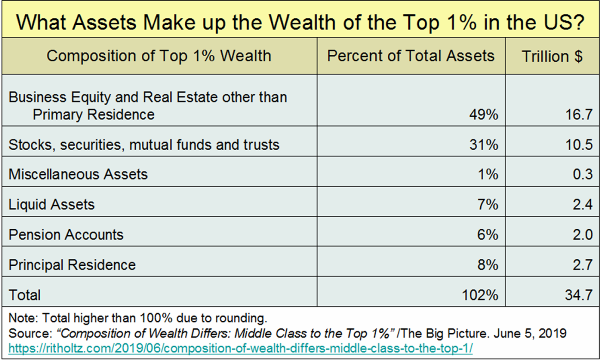“Jeff Bezos is about to become the world’s first trillionaire while we’re about to enter a depression.”
As of today, the above tweet has garnered 260,400 Likes and 52,000 retweets. Too bad it’s wrong - by a long shot. Here’s the real scoop:
If you’re thinking that’s still too much wealth so let’s tax it for the greater good, consider this: almost 80% of billionaire wealth consists of assets that are not easily converted into cash and may have to be sold before the taxman can be paid*. Unfortunately, assets tend to lose value when sellers feel compelled to sell but buyers can afford to wait for the prices to drop. And if the taxable assets of billionaires lose value, wealth tax revenue, capital investments and economic growth would all take a hit. For example, pension funds and most Americans over 35 own stocks, directly and indirectly. What would happen to the value of their holdings if billionaires sold off stocks to pay taxes? Keep in mind that over 40% of stocks.are owned by the very rich. Answer: the stock market would lose its rosy glow. I’m not saying all wealth taxes are bad, but they have to be well-designed not to backfire. More on that topic in Why Did Other Countries Drop the Wealth Tax?
Now for the top one percent in the US wealth distribution, which consists of around 1.2 million households worth $11,099,166 or more, adding up to a total net worth of a bit more than $34 trillion. Here’s where that wealth comes from:
* Many billionaires own businesses and a big chunk of their wealth is in business equity, such as property, buildings, equipment, inventory, and patents. It makes little sense to sell these assets to pay taxes, since they are a source of income. More likely, such assets would be used as collateral for loans to meet tax obligations that could not otherwise be met.
References and Links:
OECD (2018), The Role and Design of Net Wealth Taxes in the OECD, OECD Tax Policy Studies, No. 26, OECD Publishing, Paris, https://doi.org/10.1787/9789264290303-en.
Wealth-X Billionaire Census 2018 https://www.wealthx.com/reports/2018/total-wealth-research-billionaires-asset-holdings-wealth-sources/
Wolff, E. N. (2016). "Household Wealth Trends in the United States, 1962 to 2013: What Happened over the Great Recession?" RSF 2(6): 24-43. https://www.rsfjournal.org/doi/pdf/10.7758/RSF.2016.2.6.02
https://ritholtz.com/2019/06/composition-of-wealth-differs-middle-class-to-the-top-1/
https://dqydj.com/average-median-top-net-worth-percentiles/
https://www.federalreserve.gov/releases/z1/dataviz/dfa/distribute/table/

